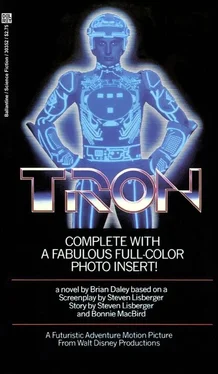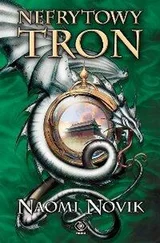His deputy team leader and colleague, Dr. Lora Baines, seemed in marked contrast to Gibbs, but they shared values and aspirations. She was in her mid-twenties, not long finished with her postgraduate studies, and already an acknowledged leader in her field; her work in computers had won her international recognition. Her blond hair was pulled back and bound simply and efficiently beneath her hardhat. The lines of her face gave her a delicate beauty that had sometimes been a disadvantage; although her eyes were wide and blue and arresting, she’d chosen understated, tinted eyeglasses. She’d occasionally been forced to battle to be accepted for her intellectual accomplishments, but never twice with the same person. She tended to be grave, efficient, and intent when working, but was cordial to those who shared her enthusiasm.
Just now, she was studying Gibbs, enjoying his excitement. The technicians had made their last adjustment, and Gibbs ordered them to stand clear. Lora sighed, “Well, here goes nothing.”
Gibbs turned to her, his quick, inquiring mind caught by that. “Hah. Interesting, interesting.” She looked at him quizzically. He went on, holding up a finger as if delivering a lecture. “Did you hear what you just said? ‘Here goes nothing.’ ”
“Well, I meant—” But it was useless to protest that she’d simply used a standard phrase. Gibbs was rolling.
“Whereas, actually,” he continued, “what we propose to do is turn something into nothing and back again.” He held up an orange, a shining, perfect fruit. “So, you might just as well have said, Here goes something and here comes nothing.”
He smiled benignly, pleased with his clarification. Lora smiled back, fondly, shaking her head in defeat. She followed him to a low, lead-shielded target platform, upon which he placed the orange. Not far away was the firing aperture of this most unusual of laser arrays. Five feet from the platform on which the orange rested was another, identical platform, this one unoccupied.
“Let me make sure we’re running,” Lora said, and crossed to her computer console. As she ran test sequences, assuring herself that all the microcomputers used to align and control the array were working properly, Gibbs pulled on his goggles. The technicians followed suit, moving clear of the enormous scaffolding, the frame. Lora, at her CRT screen, satisfied herself that her program was running correctly and, pulling on her goggles, returned to the observation point and Gibbs. “Looks good,” she said.
Gibbs nodded, enjoying the suspense, the being on the very edge of new knowledge, nearly as much as the experiment itself. Making sure that everyone had withdrawn to a place of safety, he ordered, “Let ’er rip.”
There was a hum, and the closing of relays. The laser array erupted in a beam of light unlike any that existed in nature. It enfolded the orange on its target platform. For a moment, the orange took on the appearance of a wavering, poorly received TV picture. Then it was gone.
Lora returned to her console, gave her program permission to continue, and went back to Gibbs, who was barely containing his exhilaration at the successful completion of the experiment’s first phase. The laser array swung slowly, realigning on the second, the vacant platform, as the computers recalibrated and resynchronized it.
Though no one in the lab realized it, a monitoring camera overhead watched the entire process. Every function carried out by the computer and the laser array was carefully noted for analysis. Master Control was, unknown to anyone, extremely interested in this project.
A second discharge of laser light struck the vacant platform and the orange reappeared gradually, in reverse sequence of its disappearance. When it was completely restored, five feet from its original location, the laser shut down. Lora and Gibbs rushed to examine the fruit, assured by the absence of alarms that there was no danger of radiation, or any instability in the orange’s structure.
“Perfect,” Gibbs said softly, holding up the orange and thinking of the years of work that had gone into the making of that moment. Lora stared at it too, trying to get her subjective appreciation of what she’d just seen to catch up with her objective one. There had been no scientific breakthrough like this since the Manhattan Project.
A round of applause broke into their preoccupation. Alan stood atop a nearby stairway, smiling broadly. “Beautiful!”
Gibbs smiled back, as did his deputy team leader, the businesslike Dr. Baines yielding for a moment to the charming Lora. She loved Alan’s smile, and while his serious nature struck a responsive chord in her, she sometimes found herself wishing that he’d smile more often.
“Hello, Alan,” Gibbs called. Though ENCOM’s research-and-development subdivisions were many, Gibbs and Alan had become friends through their mutual acquaintance with Lora. They respected one another’s talents and accomplishments.
When the technicians began to remove their goggles, Alan saw that it was safe to join the others, that no beams were active and that there was no danger of having a hole burned in his retina. As he descended, he asked, “Are you guys having fun disintegrating things down here?” Lora had removed her hardhat, shaking loose soft waves of hair.
Of course, Gibbs took the question literally. As Alan gave Lora a quick embrace and a kiss—making her blush—the older man corrected, “Not disintegrating, Alan; digitizing .”
Alan and Lora traded amused looks. Gibbs, unheeding, lectured. “The laser array dismantles the molecular structure of the object. The molecules are suspended in the laser beam, and then the computer reads the model back out. The molecules go into place and,” he held up the orange with a theatrical flourish, “voilà.”
And let the boardroom infighters and administrative beancounters think what they like, Gibbs added to himself. There’s not a one among ’em who’ll ever feel the way I do right now!
“Great,” Alan was saying. “Can it send me to Hawaii?”
“Yes,” Lora told him with a grin and her best airline-commercial voice, “but you have to go round trip and you must purchase your program at least thirty days in advance.” Alan laughed, and she enjoyed hearing it. Gibbs, temporarily dragged back from the dizzying heights of scientific breakthrough, chuckled too.
“How’s it going upstairs?” she added, putting aside her own elation. Alan had been preoccupied with his Tron program for weeks now.
He shrugged, and the laughter was gone. How serious, how intense he can become in a split second, she thought. Just like me, when it comes to his work. But she liked that in him. Alan had a sense of humor, but he never ignored his goals, or his responsibilities to himself and to others.
“Frustrating.” Alan frowned. “I had Tron almost ready to run, and Dillinger cut everybody with Group Seven access out of the System. Ever since he got that Master Control Program set up, the System’s got more bugs than a bait store.”
Gibbs had forgotten his triumph for the moment, drawn by talk of things he knew and liked to discuss. “Well, you have to expect some static. Computers are just machines, after all; they can’t think.”
Alan replied, “Some programs’ll be thinking soon.”
Gibbs made a wry face. “Yes, won’t that be grand! The programs and computers will start thinking and people will stop.” Shaking his head, he contemplated what he and a few others had unleashed on the world those decades ago. Was there anything beneficial that didn’t carry seeds of misfortune? Apparently not , Gibbs decided. He finished, “Lora, I’m going to stay and run some data. I’ll see you tomorrow.”
Читать дальше












